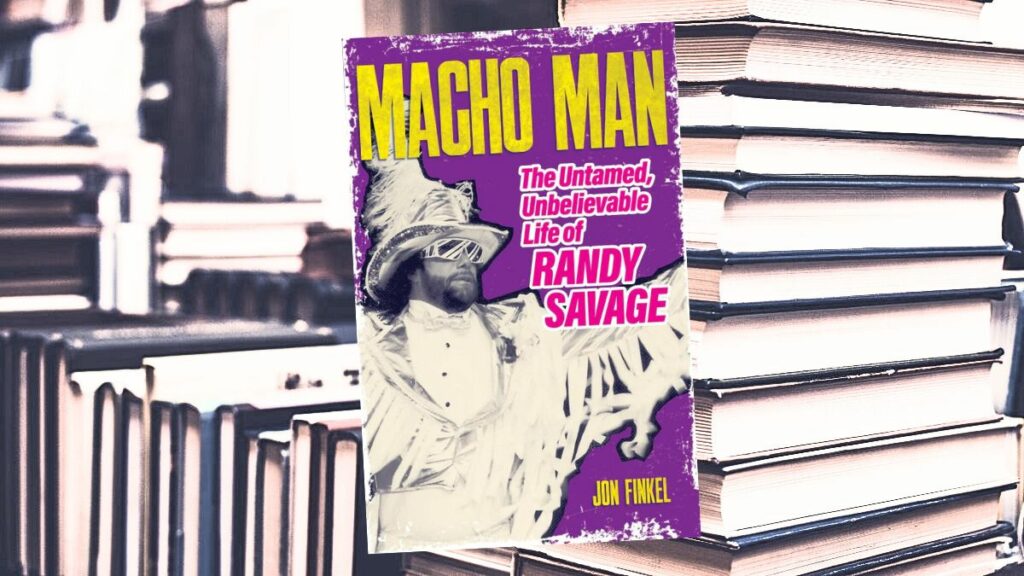I must admit to feeling a little bit spoiled by the last couple of wrestling biographies that I’ve read. Both Tim Hornbaker’s The Last Real World Champion: The Legacy of “Nature Boy” Ric Flair and Brian R. Solomon’s Blood and Fire: The Unbelievable Real-Life Story of Wrestling’s Original Sheik were not only exceptional wrestling biographies but a captivating read as well.
I had similar expectations for Jon Finkel’s Macho Man: The Untamed, Unbelievable Life of Randy Savage, but I can’t help but feel somewhat let down after turning the last page.
Like most everyone else of my age my first exposure to the Macho Man came when he first appeared on WWF programming in the summer of 1985, just a few months after the first WrestleMania. Rarely has the introduction of a new talent been better orchestrated, with all of the heel managers “scouting” the “free agent” Savage, all of whose offers he would then spurn before introducing the previously unknown Miss Elizabeth as his new manager. What followed was one of the greatest runs in WWF history, full of memorable feuds, unforgettable matches, and captivating storylines as Randy Savage enjoyed a level of prominence in the WWF, that was only arguably equaled during that time by Hulk Hogan and Roddy Piper.
And the vast bulk of this book is dedicated to this time period, and while one can’t fault the author for this, one can’t help but feel that all of this material is all too familiar, and has been told in various WWF (now WWE) sponsored television biographies, DVDs, etc … which leaves those of us who are surely the target audience for this book left wanting for something “more.”
In all fairness, the author is at a major disadvantage since his subject passed away in 2011 and his subject’s brother passed away during the early stages of the book’s preparation. And while there are interviews with some of Savage’ WWE contemporaries, including Ricky Steamboat, Tito Santana, and “Hacksaw” Jim Duggan this reader came away feeling as if they didn’t have any more insight into the Macho Man, particularly behind his wrestling persona, any better than when he started the book.
At the same time, Savage’s post-WWE run is given very short shrift in this book as he leaves the company behind on page 274, leaving only 21 pages (the rest of the book) to cover the rest of his life, including a mere seven pages devoted to his six years spent in World Championship Wrestling (WCW), a time that saw him play a significant part in that company’s brief time as the top wrestling promotion in the United States. And while there is a five-page chapter devoted to his role as Bonesaw McGraw in 2002’s blockbuster Spider-Man movie, other aspects of his post-WWE/WCW career are also briefly touched on, if at all, including his ill-advised music career and short shrift is given to his personal relationships in the final years of his life.
In other words, this quick approach to wrapping up the story was emblematic of the whole book for me. “Macho Man” Randy Savage was – easily – one of the most memorable professional wrestlers of his day and a complex character, both on the screen and behind the curtain. And after reading Jon Finkel’s Macho Man: The Untamed, Unbelievable Life of Randy Savage, I don’t feel as if I have a better grasp or understanding on who the real Randy Poffo really was, what made him tick, what he was really like and what drove him.
Maybe that book will come in the future.
RELATED LINKS
- Buy Macho Man: The Untamed, Unbelievable Life of Randy Savage at Amazon.com or Amazon.ca
- Randy Savage, Lanny Poffo and Angelo Poffo story archive
- Jon Finkel’s socials: Twitter * Substack: Books & Biceps
- SlamWrestling Master Book List

